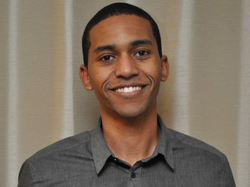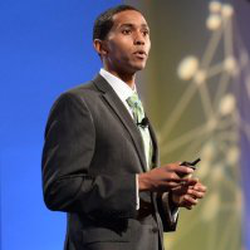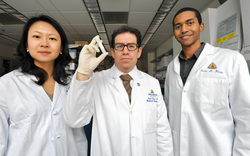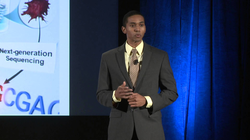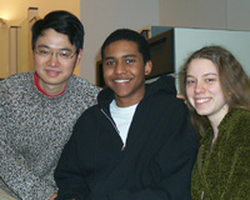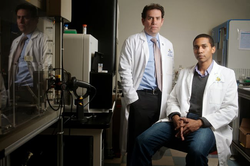Isaac Kinde

Isaac Kinde
Isaac Kinde is an Ethiopian-American Chief Scientific Officer at PapGene, Inc. [0]He is a Doctor of Medicine (M.D.) and Ph.D. in Cellular and Molecular Medicine , Johns Hopkins School of Medicine. [0] [1]Kinde is developing techniques to approve the accuracy of DNA sequencing technology and demonstrating that it might be used to detect cancers arising from the colon, pancreas, and ovaries in a simple, noninvasive manner. Already, several patents have been applied for and he’s been published in Science Translational Medicine, Nature and other journals. [1] [3]He was entitled one of the Top 30 under 30 in Biotechnology and Life Sciences according to Forbes. [1] [2]
Early life
Education
Kinde received his Bachelor's degree from the University of Maryland Baltimore County in Biological Sciences in 2005. [0]He discovered his passion for the lab as an undergraduate in the Meyerhoff Scholarship Program at the University of Maryland, Baltimore County. Kinde says that the program, which supports diversity among scientists, had a big impact on him and his younger brother Benyam. [4]After obtaining his Bachelor's degree, Kinde enrolled the Johns Hopkins University and by 2015, he became a Doctor of Medicine (M.D.) and Doctor of Philosophy (Ph.D.) in Cellular and Molecular Medicine. [0]
Career
While obtaining his M.D. and Ph.D. at Johns Hopkins University, Kinde joined the Medical Scientist Training Program at JHU. He had worked there for 9 years and 11 months and his work included observing massively parallel sequencing that applied to early cancer detection, guiding optimal treatment of cancer, cancer prognosis, and prenatal diagnostics. [0]
Since January 2015, Kinde is the Chief Scientific Officer at PapGene, a small biotechnology startup in Baltimore founded in 2014. The company is producing advanced technologies to detect cancer before a tumor can cause symptoms or be picked up by an imaging scan. Kinde’s work is inspired by a simple idea: cancers are much easier to treat when detected early. And that can translate into fewer deaths. [4]
PapGene’s technologies identify mutated genes associated with cancer in a Pap test, the traditional screen for cervical cancer that inspired the company's name. PapGene’s method can use DNA isolated from fluids used in the Pap test to screen for ovarian and uterine cancers. Similar tests could screen blood or other fluids for genes involved in other cancers as well.
PapGene’s sensitive technologies are based on tests Kinde helped develop as a graduate student at Johns Hopkins University, where he studied with cancer researcher Bert Vogelstein. Spotting cancer early requires finding a few rare, cancer-associated genetic alterations among large amounts of normal DNA. That’s made more difficult by the DNA reader’s error rate. Kinde and colleagues created a way to chemically label and mass-copy sections of DNA to identify the real mutations. [4]
Personal life and interests
Kinde credits his supportive family and years of hard work for his scientific success.
His tenacity is probably fueled by his active lifestyle — he’s an avid biker — and his devotion to coffee, which he says is rooted in his family’s Ethiopian culture. [4]
“It’s almost in our blood.
I can’t literally say that, because I’m a scientist,” Kinde says.
“But, almost.”


